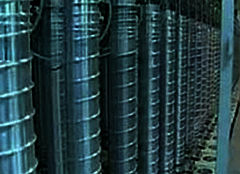Inoperation of Half of Centrifuges to Continue
» Official: “Muscat Talks Were Very Bad”
As the head of Iran’s Atomic Energy Organization stressed on Tehran’s decision to continue not operating half of the available centrifuges in the country, the spokesman of the organization stressed that the purchase of parts for the operating machines did not constitute a violation of the temporary Geneva agreement reached in November of 2013. At the same time, the spokesperson for the national security committee of the Majlis (Iran’s parliament) characterized the latest round of talks between Iran and the P5+1 major world powers in Muscat, the capital of Oman which resulted in the 2nd extension of the talks till June 2015, as “very bad.”
To demonstrate Hassan Rouhani’s seriousness and goodwill in the continued nuclear talks between Iran and the major powers, Ali Akbar Salehi, the director of Iran’s atomic energy organization spoke of the “unwritten agreement” according to which the country would continue to not bring about half of available centrifuge machines into operation for the next seven months as the talks are expected to continue. Salehi, who was for some time was the foreign minister in former president Ahmadinejad’s administration added, “Currently 20,000 centrifuges have been installed in the country’s centrifuge facilities of which 9,000 are not operational and they will not be brought into stream so long as the nuclear talks continue.”
Earlier, Rouhani’s deputy had also said that Tehran would continue to work with only 9,000 centrifuges for the time being until it sees where the “nuclear talks lead to.”
Salehi’s remarks come just weeks after Iran and the six P5+1 major powers failed to reach an agreement on Iran’s nuclear ambitions but agreed to continue their talks till June 30, 2015.
From Salehi’s latest remarks, it appears that in addition to the operational centrifuges, there are also another 2,000 centrifuges that will continue to work without active UF6 (uranium hexafluoride), a compound that is used to produce fuel for nuclear reactors and nuclear weapons. Salehi said, “Although not written in a document, the decision not to inject UF6 into our next generation centrifuges is an agreement that has been reached for the period that the nuclear talks continue. We are committed to it because we are not after complicating the talks or shaking things up there.”
Kamalvandi: Purchases not Unlawful
Despite these comments, there have been reports questioning Tehran’s commitment to the temporary agreement of November 2013 and the talks. Recently, the American Foreign Policy magazine published a piece that has added to the controversy and Iran’s commitment. The article quoted unnamed but senior American officials that the US had notified the UN Security Council on November 7, 2014 that Tehran was engaging in “illegal” acquisition of parts needed for the heavy water Arak reactor.
Behrouz Kamalvandi, the spokesperson for Iran’s atomic energy organization two days ago responded to the article by first declaring that he was unaware of such a purchase but later explained that purchasing parts had nothing to do with the Geneva 3 agreement of November 2013. “I have no knowledge of any purchases by Iran but if they were made they are not against our commitments under the Geneva agreement,” he said.
The British news agency Reuters posted a news report quoting the UN group that monitors the implementation of the nuclear agreement with Iran that since March of 2014 no violations had been reported pertaining to Tehran’s commitments under the November 2013 Geneva agreement with the P5+1 world powers. Kamalvandi continued, “Based on what has been reported, Iran is not in violation of its commitments for the previously extended six months of the agreement and for the recently extended period because no new major equipment has been installed.”
The November 2013 agreement commits Iran not to enrich uranium to levels beyond 5 percent purity and not to expand the activities at Natanz, Fardow and Arak nuclear facilities. Western experts have said that plutonium – a material that can be used to produce nuclear weapons – can be produced at the Arak facility.
MP Quotes Araghchi: Agreement in 4 Months
While the detailed and specific reasons why the nuclear talks failed to produce results by the November 2014 deadline continue in Iran, one member of Iran’s negotiating team, deputy foreign minister Abbas Araghchi talked with members of the Majlis’s national security and foreign policy committee. Speaking to a reporter from Fars news agency later, the spokesperson of the committee, Hossein Naghavi, quoted Araghchi to have said, “In the course of talks following the Geneva agreement (of 2013) and after long talks, many common grounds have been reached but a wide gap still exists even as the red lines of each side are still respected, even as both sides have changed their red lines and demands.”
According to Naghavi, Araghchi characterized the Muscat talks that were held between Iran’s foreign minister Javad Zarif and US secretary of state John Kerry a week prior to their last round of talks as “very bad.” He is quoted to have said, “It was natural under those circumstances to think about ending the talks. The extension the talks was made on the basis of a logical decision even though we believed that an agreement could be reached even sooner than seven months, but still we agreed to the seven month extension.”
Naghvi also said that Araghchi believed that a “general” agreement could be reached in four months while the details are hammered out in the next three months.
The next round of talks between the two sides have not been scheduled or announced. During a seminar against violence ad extremism last week, Zarif said the next round of talks would held “soon.”


